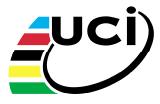 The UCI licensing board has announced the recipients of the latest batch of 4 year ProTour licenses. A ProTour license allows teams a spot in all ProTour races, setting the stage for a team’s season.
The UCI licensing board has announced the recipients of the latest batch of 4 year ProTour licenses. A ProTour license allows teams a spot in all ProTour races, setting the stage for a team’s season.
Most of the teams are current ProTour license holders, reapplying when their 4 year license expired. However, two teams – BMC and Luxembourg Pro Cycling Project – are new to the ProTour ranks.
BMC competed last season with Pro Continental status. While holding a ProTour license gets you in the races, lack of one doesn’t necessarily keep you out. Instead, non-ProTour teams can try for one of the wildcard spots. Now, BMC does not have to worry about trying to get those wildcard spots.
If ever there was a shoe-in to receive a license, however, the Luxembourg Pro Cycling Project may just be it. Consisting of Frank & Andy Schleck, Stuart O’Grady, and Jens Voigt among others, the team is poised to be a powerhouse next season. There is still a possibility that Fabian Cancellara will also join his former Saxo Bank teammates.
With the two new additions came two teams that were denied their applications – Geox-TMC and Cofidis.
Geox-TMC has been particularly vocal about the decision. Their roster would seem up to par on paper. They’ve got Carlos Sastre – 2008 Tour de France winner – and Denis Menchov. Menchov as among his palmares a 2009 win at the Giro, and a 2010 podim finish in the Tour de France.
From their own website, the UCI’s mission is;
The International Cycling Union (UCI) is cycling’s International Federation recognised by the International Olympic Committee (IOC). The UCI was founded in Paris in 1900.
The UCI administers and promotes the development of the eight disciplines of cycling all around the world (road, track, mountain bike, BMX, para-cycling, cyclo-cross, trials and indoor cycling). Over the last 10 years, the UCI has intensified its development activities on all five continents.
The UCI’s mission is to develop and promote cycling, in close collaboration with National Federations, be it as a competition sport and its associated values (effort, well-being and fair play), as a healthy recreational activity or as a means of transport.